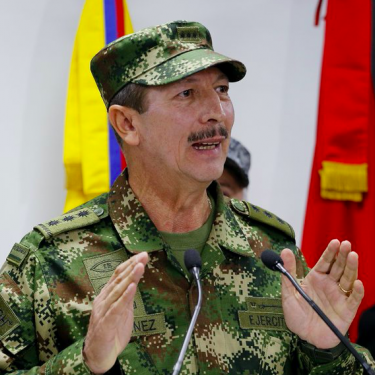Colombia: NYT story about Colombian army prompts alarming wave of intimidation

Reporters Without Borders (RSF) calls on the Colombian authorities to respect the media’s work and condemns the poisonous climate for independent journalism, including verbal attacks and intimidation attempts, since a New York Times story on 18 May reflecting badly on the Colombian army high command.
The article by Nicholas Casey reported that army commander-in-chief Gen. Nicacio Martínez had ordered his troops to double the number of criminals and militants captured or killed in military operations, even if that meant more civilian casualties. Based on official army documents and interviews with senior army officers, the report triggered a series of aggressive statements and threats against Casey and Federico Rios, a freelance photographer who often works for the NYT in Colombia.
Defence minister Guillermo Botero’s immediate claim that the article was “full of inconsistencies,” was quickly followed by condemnation from other politicians such as Sen. Álvaro Uribe Vélez (a former president) and Sen. María Fernanda Cabal, who insinuated on Twitter by means of misleading photos that Casey was corrupt and in the pay of the FARC guerrillas.
Widely relayed on social networks, these aggressive reactions prompted a spate of insults and threats against Casey and Rios, with the result that they left Colombia on 19 May as a safety measure.
Despite all the attacks questioning the NYT story’s accuracy, the Colombia government created an independent commission of enquiry into the army directives on 24 May, the attorney-general opened a preliminary investigation into Gen. Martínez on 28 May and the army announced on 29 May that it was going to modify its instructions to combat troops.
“This case highlights how hard it is for the press to tackle public interest subjects that reflect badly on Colombia’s politicians and authorities,” said Emmanuel Colombié, the head of RSF’s Latin America bureau.
“The vilification and intimidation that preceded and followed this article are disgraceful and unacceptable, and constitute a grave threat to press freedom in Colombia. President Ivan Duque and his administration must encourage the emergence of independent media, which are essential for any democracy worthy of the name.”
The affair has also made waves within the Colombian media, some of which already had the information revealed by the NYT. Well-known columnist Daniel Coronell wrote in his column for the newsweekly Semana on 26 May that the magazine had been in possession of this information since February but decided not to publish it. He was promptly fired without any proper explanation being offered although he had worked for Semana for 19 years.
“The government tried to cover up this story without imagining that it might be revived by the New York Times,” Coronell told RSF, deploring the fact that, “self-censorship is standard practice within many news organizations in Colombia.”
Colombia is ranked 130th out of 180 countries in RSF’s 2019 World Press Freedom Index.



